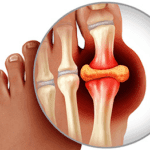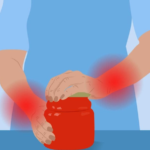Introduction
Arm numbness and tingling are sensations that nearly everyone experiences at some point. These symptoms, medically known as paresthesia, can range from mildly annoying to severely debilitating, depending on their cause and duration. While temporary numbness can occur from pressure on the nerves (such as sleeping on your arm), persistent or recurrent symptoms may indicate an underlying health issue that requires medical attention. This article explores the various causes, symptoms, diagnostic methods, and treatments associated with arm numbness and tingling.
Anatomy of the Arm
Understanding the causes of arm numbness and tingling starts with an overview of the arm’s anatomy. The arm consists of bones, muscles, blood vessels, and nerves. The primary nerves responsible for sensation in the arm are the median, ulnar, and radial nerves. These nerves can be compressed or damaged at various points, leading to sensory disturbances.
Common Causes of Arm Numbness and Tingling
Peripheral Neuropathy
Peripheral neuropathy refers to damage to the peripheral nerves, which transmit signals between the central nervous system and the rest of the body. Causes of peripheral neuropathy include diabetes, infections, autoimmune diseases, and exposure to toxins.
- Diabetes: One of the most common causes, diabetic neuropathy, affects more than half of all diabetes patients.
- Autoimmune Diseases: Conditions like lupus, rheumatoid arthritis, and Guillain-Barre syndrome can lead to neuropathy.
- Infections: Viral or bacterial infections such as Lyme disease, shingles, and HIV can cause nerve damage.
- Toxins: Heavy metals like lead and mercury, as well as certain chemotherapy drugs, can be toxic to nerves.
Cervical Radiculopathy
Cervical radiculopathy occurs when a nerve in the neck is compressed or irritated as it exits the spinal cord. This can be caused by:
- Herniated Discs: Discs that have ruptured or bulged can press on nerve roots.
- Degenerative Disc Disease: Age-related changes in the spine can narrow the spaces where nerves exit.
- Trauma: Injuries from accidents or sports can damage the cervical spine.
Carpal Tunnel Syndrome
Carpal tunnel syndrome is a condition where the median nerve is compressed as it travels through the wrist. It is commonly associated with repetitive wrist movements, such as typing or using a mouse. Symptoms often include tingling, numbness, and pain in the thumb, index, and middle fingers.
Cubital Tunnel Syndrome
Similar to carpal tunnel syndrome, cubital tunnel syndrome involves compression of the ulnar nerve at the elbow. It can cause tingling and numbness in the ring and little fingers, and sometimes weakness in the hand.
Thoracic Outlet Syndrome
Thoracic outlet syndrome occurs when blood vessels or nerves between the collarbone and first rib are compressed. Causes include anatomical defects, trauma, or repetitive activities. Symptoms can include numbness and tingling in the arm and fingers.
Vascular Issues
Conditions affecting blood flow to the arm can also cause numbness and tingling. These include:
- Peripheral Vascular Disease: Narrowing of blood vessels can reduce blood flow.
- Blood Clots: A clot in the arm can block circulation, leading to numbness and swelling.
Autoimmune Diseases
Autoimmune conditions like multiple sclerosis can cause episodes of numbness and tingling. Multiple sclerosis affects the brain and spinal cord, leading to a wide range of neurological symptoms.
Medication Side Effects
Certain medications, especially those used in chemotherapy, can cause peripheral neuropathy as a side effect. It’s important to discuss all medications with a healthcare provider to determine if they could be contributing to symptoms.
Injuries and Trauma
Physical injuries to the arm, shoulder, or neck can damage nerves and lead to numbness and tingling. This includes fractures, dislocations, and soft tissue injuries.
Symptoms and Diagnosis
The symptoms of arm numbness and tingling can vary depending on the underlying cause. Common symptoms include:
- Persistent or intermittent tingling or “pins and needles”
- Numbness in the arm, hand, or fingers
- Weakness in the affected arm
- Pain or discomfort, especially with movement
- Swelling or changes in skin color
Diagnosing the cause of these symptoms typically involves a thorough medical history and physical examination. Diagnostic tests may include:
- Electromyography (EMG): Measures the electrical activity of muscles.
- Nerve Conduction Studies: Assess how well nerves transmit signals.
- Imaging Studies: X-rays, MRIs, or CT scans can identify structural issues.
- Blood Tests: Can detect underlying conditions like diabetes or infections.
Treatment and Management
The treatment of arm numbness and tingling depends on the underlying cause. Common approaches include:
Medications
- Pain Relievers: Over-the-counter or prescription medications can help manage pain.
- Anti-inflammatory Drugs: Reduce inflammation that may be compressing nerves.
- Medications for Neuropathy: Drugs like gabapentin or pregabalin can relieve nerve pain.
Physical Therapy
Physical therapy can improve strength, flexibility, and range of motion. It can also teach techniques to reduce nerve compression.
Surgery
In severe cases, surgery may be required to relieve nerve compression, repair damaged nerves, or address structural issues.
Lifestyle Changes
- Ergonomic Adjustments: Modifying workspaces to reduce strain on the arms and wrists.
- Exercise: Regular physical activity can improve overall health and reduce the risk of conditions like diabetes.
- Diet: Eating a balanced diet rich in vitamins and minerals that support nerve health.
Frequently Asked Questions
Q: When should I see a doctor for arm numbness and tingling?
A: You should see a doctor if your symptoms are persistent, worsening, or associated with other concerning signs like chest pain, shortness of breath, or difficulty moving your arm.
Q: Can stress cause arm numbness and tingling?
A: Yes, stress and anxiety can cause physical symptoms, including numbness and tingling in the arms. However, it’s important to rule out other causes.
Q: How can I prevent arm numbness and tingling?
A: Preventive measures include maintaining a healthy lifestyle, avoiding repetitive strain, and managing chronic conditions like diabetes.
Q: Are there home remedies for relieving arm numbness and tingling?
A: Home remedies may include rest, ice, elevation, and over-the-counter pain relievers. However, persistent symptoms should be evaluated by a healthcare professional.
Conclusion
Arm numbness and tingling can result from a variety of conditions, ranging from temporary nerve compression to serious medical disorders. Understanding the potential causes and seeking appropriate medical evaluation and treatment are crucial for managing these symptoms effectively. By addressing the underlying cause, many individuals can find relief and prevent long-term complications.





